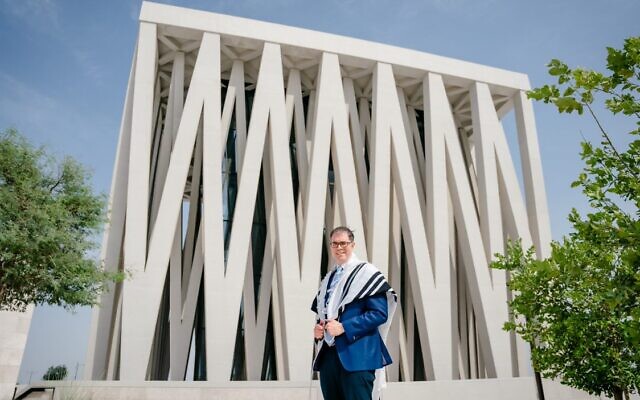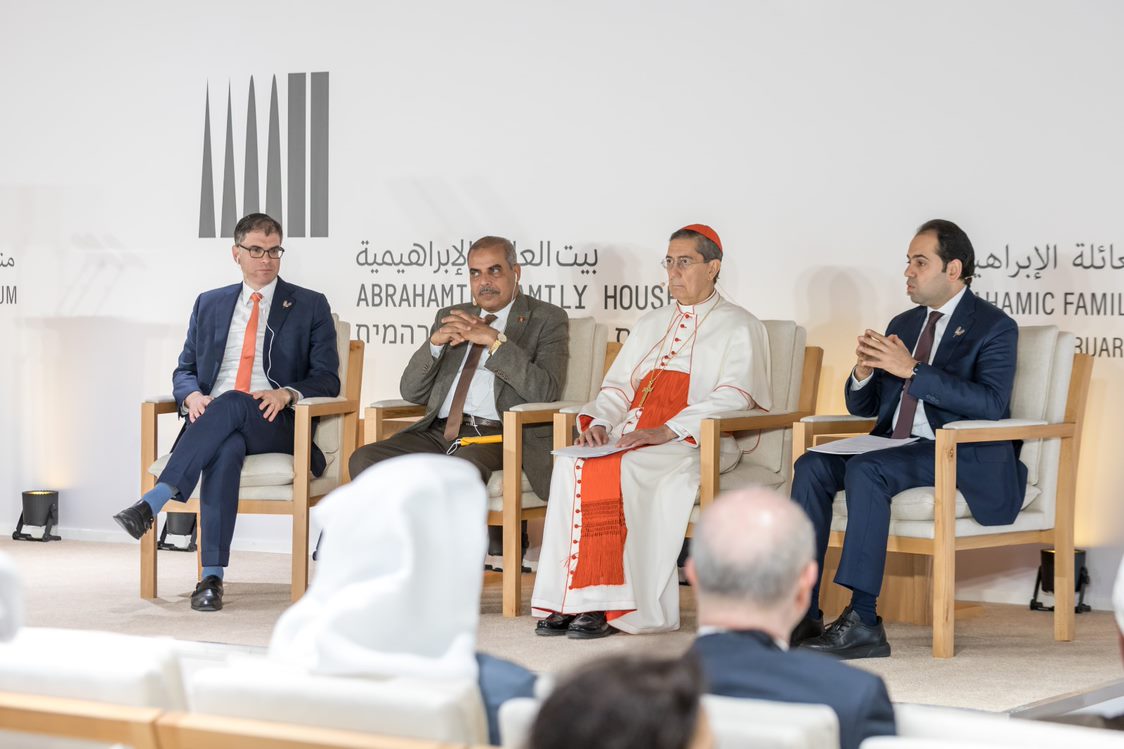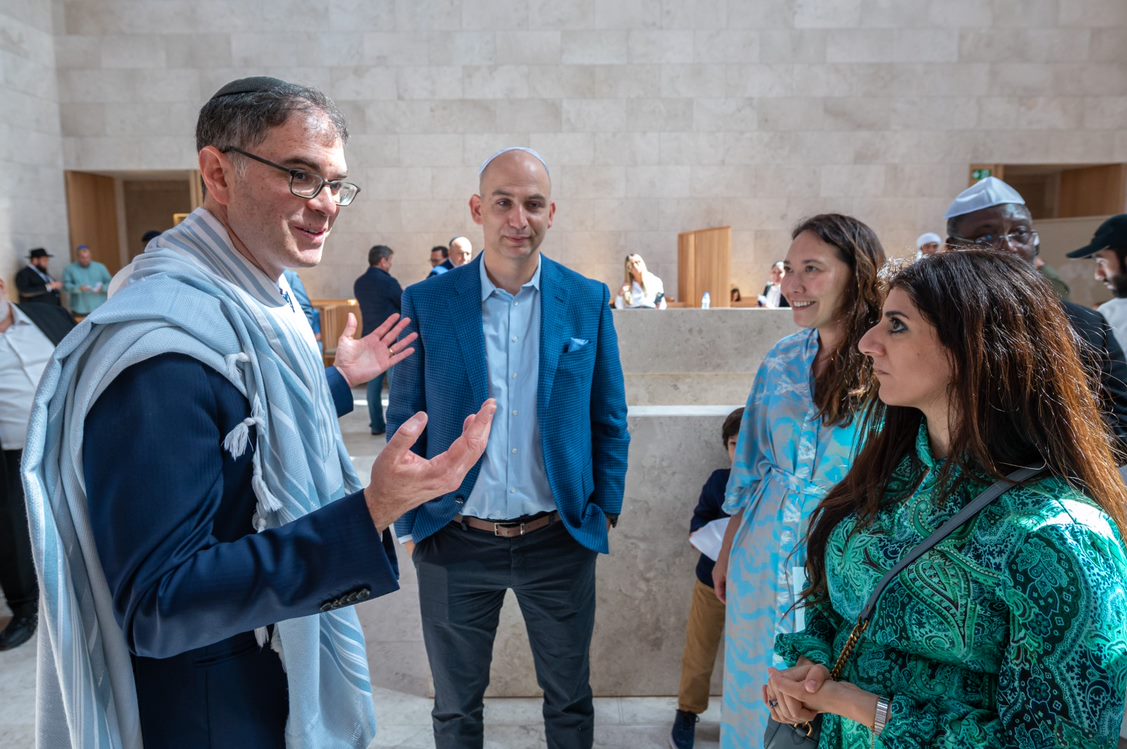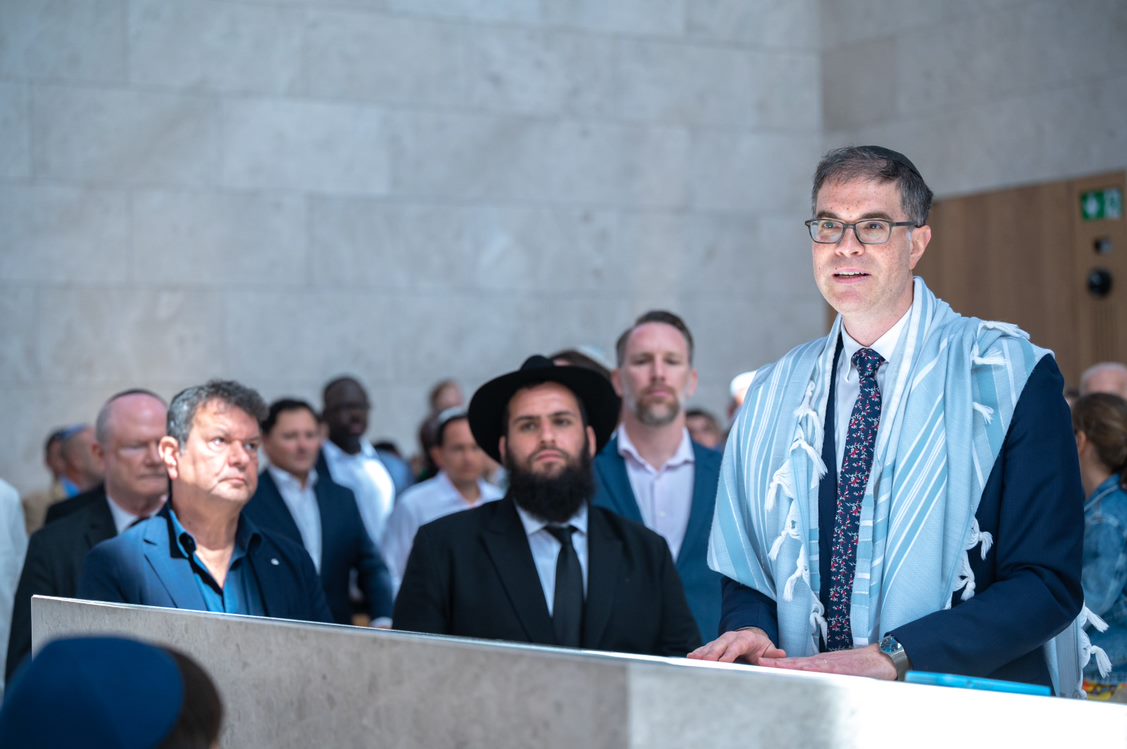Waiting for ice in the desert…and other tales of being a Chief Rabbi in the UAE
Exclusive interview: Leading the first Jewish community to be established in an Arab country for a century may be challenging for Chief Rabbi Yehuda Sarna, but it’s also his passion
Jenni Frazer is a freelance journalist

Rabbi Yehuda Sarna is waiting for the winter months with some anticipation. Because then, and only then, will the mikvah in the Moses Ben Maimon Synagogue in Abu Dhabi be able to operate.
As the Chief Rabbi of the newly opened synagogue — part of the Abrahamic Family House complex — the softly-spoken Rabbi Sarna explains: “It’s a very familiar issue in parts of America and Israel. Typically, the way it’s done is by bringing a large piece of ice or snow that has fallen naturally in a nearby climate, and placing it so that it melts”.
Ensuring a working mikvah in a desert country is one of the many challenges facing the 45-year-old chief rabbi, who has also been chief rabbi of the Jewish Council of the Emirates, since it was established in 2019.

Pic: Alin Constantin Photography for People Creative
But the clear sense is that the Montreal-born rabbi, who also teaches at New York University, both in New York itself and its offshoot centre in the Emirates, is relishing the challenges. Since the Abraham Accords were signed in 2020, there has been a stratospheric growth in the Jewish presence in the Emirates. It has soared from an “under-the-radar” community in Dubai, whose activities were originally kept secret, to today’s extremely public footprint in the Abrahamic Family House, where the Moses Ben Maimon Synagogue shares a city centre complex with a mosque and a church. All is done with the blessing of the Emirati government.
There could scarcely be a better fit for a role in interfaith work in the Arab world than this rabbi. He has long been involved in such work in New York — illustrated with great clarity when Muslim students on the NYU campus asked him to help them confront creeping Islamophobia, based on his experience in combating antisemitism.

ln the anti-Muslim backlash which followed 9/11 in New York, the rabbi made an unlikely but lasting friendship with Imam Khalid Latif, and the two served as NYU student chaplains before Rabbi Sarna made his first visit to the Emirates in 2010.
“In 2016 I learned about the Jewish community that was meeting in Dubai, and I began to help them in any way that I could.” Three years later the Jewish Council of the Emirates was established, “as a vehicle to bring the community from a private group meeting in villas, to be part of the cultural landscape of the UAE.”
At that point, before the signing of the Abraham Accords, the Jews of the Emirates numbered about 1,000. Today, says Rabbi Sarna, that number has tripled: about 75 per cent live and work in Dubai, with the remainder in Abu Dhabi, where the Abrahamic Family House is based.
“Never could I have imagined what would follow so swiftly — never, never, never”, says the rabbi.
His aim, he says, “was always to figure out the right path for establishing the community — how centralised or decentralised it would be. And then along came the Abraham Accords, and an influx of Israeli tourists coming to the UAE. So we quickly discovered that so much of the Jewish community was going to exist in a decentralised way — kosher restaurants, hotels that could easily go kosher, and new residents from different backgrounds, Ashkenazi, Sephardi, Chabad… if you like, there was a busting open of the community after the Accords”.
Before the Accords and “mass Jewish tourism”, everything was “very private, very quiet.” Suddenly everything changed, and Rabbi Sarna was asked to advise the architects of the Abrahamic Family House — the first interfaith centre in the Arab world and the first purpose-built synagogue in the Gulf in almost a century. “This was not going to be quiet or tucked away, this was going to be in the middle of the city.”

He hopes that the Abrahamic Family House will act as “a very powerful educational tool for people who are not Jewish, who would visit, and had never set foot in a synagogue or met a Jewish person”.
The year 2019 — just before the signing of the Accords — was designated as the Year of Tolerance by the UAE rulers. In that year the Jewish community made a significant act by commissioning a sefer Torah in the name of Sheikh Zayid, the country’s founder, and presenting it as a gift to the then Crown Prince, now president, Mohammed bin Zayid. Two months later the Abrahamic Family House was announced as a formal project.
Rabbi Sarna had an on-site office during the building of the complex, and experienced every step of the way with the workers. Remarkably there were no accidents during construction, as immense safety precautions were taken.
“One night, when the building was almost finished, but before it was open, I walked through it with some of the other people who had been involved in the project from the first day. We walked through all the houses… up to that point there had always been activity and noise, but this was total quiet. It was midnight and we felt blessed by the light of the moon. To walk through each of the spaces, was extraordinary — just the moonlight and the light from our cellphones”.

On February 16 there was an opening of the complex as a whole.A few days later the Moses Ben Maimon Synagogue was consecrated. “Three hundred and fifty people showed up in the sanctuary, which only has 200 seats. The first person who arrived was Sir David Adjaye, the architect, with his children. He told me that he wanted to see how people acted when they walked in. As people turned up, he was watching the people and I was watching him. He had put his heart and soul into what he knew would be a historic building. The source of inspiration was the succah, and the idea of travelling through the desert and finding a place to rest”.
Rabbi Sarna has now escalated his presence in the UAE to once a month. As well as his rabbinical duties, or what he calls “keeping my finger on the pulse”, he teaches at the NYU Abu Dhabi campus. Moving permanently to the Emirates is “always on the table”, he says with a smile, but notes that, at the moment, home is still New York. Two of his daughters (he and his wife have six children) are currently in Israel and so take the opportunity to visit him whenever he is in Abu Dhabi or Dubai.
Most of the weekly participants in the Moses Ben Maimon synagogue are Abu Dhabi residents. So far, though there is a nascent Jewish cemetery administered by the Chabad movement, because there are very few Jews who also hold UAE citizenship, deaths tend to be dealt with in the deceased’s country of origin, though that may change.
The new chief rabbi is full of plans for “seizing this historic opportunity”, not least the unprecedented teaching of the Holocaust in the UAE school curriculum.
Because his wife’s family was saved in Berlin by an Arab doctor — Egyptian medic Mohamed Helmy, named as a Righteous Among the Nations by Yad Vashem — Rabbi Sarna has been sharing Dr Helmy’s story in the Emirates. “His story is important, not just for Jewish people, but for Arab audiences to hear”.
He adds: “This really is the moment of ‘may 1,000 flowers bloom’. There is so much to do. I always try to centre myself by asking, what is the long-term vision? Talk to any rabbi and they will tell you, running a synagogue on its own is complex enough, let alone in a country that has never had a dedicated space for a synagogue”. Paying a heartfelt tribute to the “boldness and courage” of the UAE leadership, he asks, “how do we match that in terms of wisdom, commitment and partnership?”
With a smile, he notes that there have been occasional “brick walls” in the road to building this remarkable new Jewish community. “Five years ago, if the same thing had happened, we would have said, that’s not a brick wall, that’s the biggest privilege.”
FACTS:
Figures recently published by the HVS Consulting group, monitoring Israeli tourism to the Emirates since the signing of the Abraham Accords.
“More than 85,000 Israelis visited Dubai in the first two months of 2023, a 212 per cent year-over-year increase. Israel has become the fastest growing source tourism market for Dubai and is now its eighth-largest source tourism market overall.
“Over 9,000 Israelis checked into Abu Dhabi hotels in the first two months of 2023, an 84 per cent year-over-year increase. Israel has emerged as the 11th-largest source market for tourism to Abu Dhabi.
“The UAE and Israel have agreed to increase the number of direct flights between the two countries, approving the addition of seven regular weekly flights between Tel Aviv and Dubai. With 49 daily flights set to operate between Tel Aviv and Dubai, the Tel Aviv-Dubai flight route now represents the second-most popular daily flight route from Tel Aviv. Emirates Airline will take advantage of this opportunity to operate an additional daily flight from Tel Aviv”.

Thank you for helping to make Jewish News the leading source of news and opinion for the UK Jewish community. Today we're asking for your invaluable help to continue putting our community first in everything we do.
For as little as £5 a month you can help sustain the vital work we do in celebrating and standing up for Jewish life in Britain.
Jewish News holds our community together and keeps us connected. Like a synagogue, it’s where people turn to feel part of something bigger. It also proudly shows the rest of Britain the vibrancy and rich culture of modern Jewish life.
You can make a quick and easy one-off or monthly contribution of £5, £10, £20 or any other sum you’re comfortable with.
100% of your donation will help us continue celebrating our community, in all its dynamic diversity...
Engaging
Being a community platform means so much more than producing a newspaper and website. One of our proudest roles is media partnering with our invaluable charities to amplify the outstanding work they do to help us all.
Celebrating
There’s no shortage of oys in the world but Jewish News takes every opportunity to celebrate the joys too, through projects like Night of Heroes, 40 Under 40 and other compelling countdowns that make the community kvell with pride.
Pioneering
In the first collaboration between media outlets from different faiths, Jewish News worked with British Muslim TV and Church Times to produce a list of young activists leading the way on interfaith understanding.
Campaigning
Royal Mail issued a stamp honouring Holocaust hero Sir Nicholas Winton after a Jewish News campaign attracted more than 100,000 backers. Jewish Newsalso produces special editions of the paper highlighting pressing issues including mental health and Holocaust remembrance.
Easy access
In an age when news is readily accessible, Jewish News provides high-quality content free online and offline, removing any financial barriers to connecting people.
Voice of our community to wider society
The Jewish News team regularly appears on TV, radio and on the pages of the national press to comment on stories about the Jewish community. Easy access to the paper on the streets of London also means Jewish News provides an invaluable window into the community for the country at large.
We hope you agree all this is worth preserving.





















